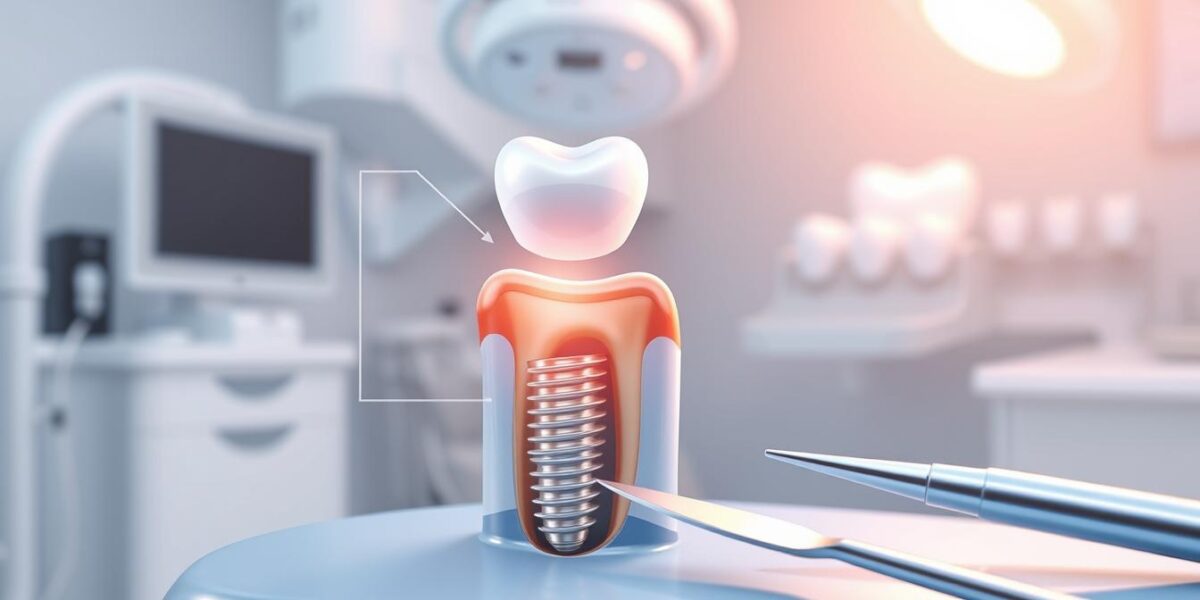Learn about single tooth implant cost without insurance and explore financing options, average prices, and factors that affect the total expense of your dental restoration
Are you curious about the single tooth implant cost without insurance? Dental care costs are changing, and knowing the real price of implants is key. In this guide, we’ll look at the average cost of a single tooth implant in the U.S. We’ll also cover what affects the price and how to pay for it to get your smile back.

Key Takeaways
- The cost of a single tooth implant without insurance can range from $3,000 to $6,000 on average.
- Dental implants are considered the gold standard for tooth replacement by the American Dental Association.
- Geographical location, insurance coverage, and the type of materials used can impact the overall cost of a single-tooth implant.
- Dental schools and financing options can help reduce the out-of-pocket expenses for uninsured patients.
- Proper post-operative care and follow-up appointments are essential for the long-term success of dental implants.
Understanding Dental Implants: A Comprehensive Overview
Dental implants are a popular choice for replacing missing teeth. They are not like dentures or bridges. Dental implants are fixed into the jawbone, giving a strong base for new teeth. This method offers a natural look and function that can last a lifetime with the right care.
What Makes Dental Implants Different
Dental implants stand out because they are made to look and work like real teeth. They have a titanium post that acts as the root and a crown on top. This design not only makes your smile look natural but also helps keep your jawbone strong, preventing it from shrinking.
The Structure of a Dental Implant
A dental implant has three parts: the implant post, the abutment, and the crown. The implant post is a titanium or zirconia screw that goes into the jawbone. It’s the base for the new tooth. The abutment connects the post to the crown, which is the tooth itself.
Benefits of Choosing Implants
- Improved oral health and function: Dental implants help keep your natural teeth strong and prevent bone loss, leading to better oral health.
- Enhanced aesthetics: Dental implants are made to match your natural teeth, making your smile look great.
- Increased confidence: With a strong, natural-looking tooth replacement, you can eat, speak, and smile without worry.
- Long-term durability: With the right care, dental implants can last a lifetime, making them a smart investment in your health.
If you need a single tooth or a full mouth fixed, affordable implant dentistry and low-cost dental implants offer a reliable, long-lasting solution. They can change your smile and improve your life.
The Complete Dental Implant Process
Getting a dental implant is a detailed process with several steps. First, you’ll have a consultation with your dentist. They’ll check your teeth and decide if you’re right for the implant.
Next, the implant surgery happens. A titanium post is put into your jawbone. This post is the base for your new tooth. After surgery, your jawbone and the post bond together.
- Initial Consultation and Assessment
- Implant Placement Surgery
- Osseointegration (Healing Period)
- Abutment Attachment
- Crown Placement
After bonding, an abutment is attached. This connects the final crown. Then, the crown is placed, finishing your economical tooth implant options and restoring your smile.
Sometimes, you might need extra steps like bone grafting or sinus lifts. These can increase the implant tooth pricing. But they’re important for a strong, lasting implant.
| Procedure | Average Cost |
|---|---|
| Dental Implant | $1,500 – $2,500 |
| Implant Crown | $1,500 – $2,800 |
| Total Cost per Tooth | $3,500 – $5,500 |
The whole dental implant process takes a few months. Each step adds to the cost. So, it’s key to know the whole treatment before starting.
Single Tooth Implant Cost Without Insurance
Finding out how much a single tooth implant costs without insurance can be tricky. Many things affect the final price. On average, it can cost between $3,000 and $6,000. This includes the implant, the abutment, and the crown.
Average Cost Breakdown
Here’s a breakdown of what you might pay for a single tooth implant:
- Consultation and evaluation: $150
- Panoramic X-ray: $250
- CT scan: $500
- Tooth extraction: $300
- Bone grafting: $500 to $2,000
- Abutment: $300
- Implant crown: $2,000
- Dental implant: $3,000 to $5,000
Additional Procedure Expenses
There might be extra costs for things like diagnostic tests and temporary restorations. These can add up and affect the total cost of the implant.
Material Cost Variations
The type of material used for the implant can change the price. Titanium implants are usually cheaper than zirconia ones. The dentist’s skill, where you live, and how complex the case is also play a role in the cost.
| Material | Average Cost |
|---|---|
| Titanium Implant | $3,000 – $4,500 |
| Zirconia Implant | $4,500 – $6,000 |
“Dental implants have a 95% success rate, making them a reliable and long-term solution for missing teeth.”
Factors Affecting Implant Costs
Figuring out the cost of dental implants can be tricky. Many things can change the final price. Knowing these factors is key for those without insurance looking for tooth replacement.
The material of the implant is a big factor. Titanium implants, the most common, cost between $1,500 and $2,000 per tooth. Zirconia implants, which are stronger and look more natural, can cost $3,000 to $4,800 per tooth.
The dentist’s experience also matters. More experienced dentists might charge more. But, newer dentists might offer lower prices. The complexity of the procedure, like bone grafting, can also raise the cost.
Where you live is another big factor. Uninsured tooth replacement costs are often higher in cities and areas with a high cost of living. Prices can range from $2,000 to $8,000 per tooth. But, in rural areas, prices can be lower, starting at $2,000 per tooth.
Many things can affect the total cost of dental implants. This includes how many implants you need, if you need extra procedures, and the quality of the materials. By understanding these, you can make better choices and find ways to pay that fit your budget.

“Dental implants are a significant investment, but the long-term benefits they offer can make them a wise choice for many individuals.”
Geographic Cost Variations Across the United States
The cost of affordable implant dentistry and low-cost dental implants changes based on where you are in the United States. Prices for dental implants can differ a lot from one state to another. They can also change a lot between cities and rural areas.
Regional Price Differences
In states like Oklahoma, dental implants cost about $1,500 to $2,000 for one implant. For multiple implants, prices range from $3,000 to $30,000. This is much cheaper than in states like New York or California, where prices can go up to $6,000 to $8,000 per tooth.
In Oklahoma, All-on-4 or mini-implants are even more affordable. They cost between $1,000 to $3,000 per implant.
Urban vs. Rural Cost Comparison
States like Tennessee have lower incomes, which leads to lower dental prices. This is because there’s more competition among dentists. On the other hand, cities usually cost more because of higher overhead and demand.
State-by-State Price Analysis
In South Carolina, people have better access to dental care over time. Prices for things like gum release surgeries are competitive. Arizona also has high patient satisfaction and hopes for more savings on oral health procedures.
Overall, where you are in the United States affects dental implant prices. Competition among dentists in different areas changes prices. States like Oklahoma, Tennessee, South Carolina, Arizona, and Virginia show a trend of affordable dental care.
Alternative Payment Options and Financing Solutions
Dental implants can be pricey, but there are ways to pay for them without insurance. Options include dental discount plans, flexible payment plans, and medical financing. These choices help patients find affordable tooth replacement solutions.
Dental Discount Plans
Dental discount plans give members lower fees for dental services. They can save up to 60% on procedures like implants. This makes them a good choice for those looking to save money.
Flexible Payment Plans
Dental offices often have payment plans. These plans let patients pay over time, making implants more affordable. This is especially helpful for those without insurance.
Medical Financing Options
Medical financing companies offer loans for dental work, including implants. These loans have good interest rates and flexible payback plans. They’re a popular choice for financing implants.
Combining Insurance Coverage
Dental insurance might not cover all implant costs, but it can help with some parts. Patients should check if they can use both health and dental insurance. This can lower what they have to pay out of pocket.
Knowing about different payment and financing options helps patients make better choices. It lets them find the best way to get dental implants while managing costs.
| Payment Option | Typical Cost Range | Key Considerations |
|---|---|---|
| Dental Discount Plans | $1,000 – $3,000 | Savings of up to 60% on dental procedures |
| Flexible Payment Plans | $175 – $550 per month | Repayment terms typically 2-10 years |
| Medical Financing | $1,500 – $6,000 | Interest rates range from 6% to 35% APR |
| Health Savings Accounts (HSAs) | Dependent on account balance | Tax-advantaged funds for qualified medical expenses |
| Flexible Spending Accounts (FSAs) | Dependent on annual contribution | Pre-tax dollars can be used for dental implants |

“Exploring alternative payment options and financing solutions can make dental implants more accessible and help patients manage the costs associated with economical tooth implant options and implant tooth pricing.”
Ways to Reduce Dental Implant Costs
Dealing with dental implant costs can be tough. But, there are ways to make it easier. Getting treatment at dental schools or teaching clinics is one option. Here, students under supervision do the work at lower prices. This can greatly reduce your self-pay implant costs.
Another idea is dental tourism. Going to places with cheaper healthcare can save a lot on reasonable implant tooth solutions. But, make sure to check the quality of care and if you can get help when you get back home.
Dentists also have flexible payment plans or work with financing companies. This way, you can pay for implants over time. It’s especially helpful if you don’t have dental insurance.
Dental Schools and Teaching Clinics
- Dental schools offer high-quality implant services at significantly reduced prices, with procedures performed by supervised students.
- These clinics can provide discounts of up to 50% compared to private practice costs.
Dental Tourism Considerations
- Traveling to countries with lower healthcare costs can save up to 70% on the cost of dental implants.
- Research the qualifications and reputation of the dentist and ensure follow-up care is available upon return.
- Factor in the cost of travel and accommodations when considering dental tourism as an option.
Payment Plans and Medical Financing
Many dental practices offer flexible payment plans or partner with medical financing companies like CareCredit. This makes self-pay implant costs easier to handle. You can pay over several months or years, making it more budget-friendly.
“Dental implants are a significant investment, but there are ways to make them more accessible. Exploring options like dental schools, payment plans, and medical financing can help make this life-changing treatment more affordable.”
Long-term Value and Investment Perspective
The cost of single tooth implants without insurance might seem high at first. But, think about the long-term benefits. Dental implants can last a lifetime with the right care. They are better than dentures or bridges, which often need to be replaced or adjusted.
Implants help keep your bone healthy and your face looking good. They work like your natural teeth, making them a smart choice for tooth replacement.
Investing in dental single tooth implant cost without insurance can save you money in the long run. Even though they might cost more upfront, implants from experienced dentists like those at Fillmore Dental Group in Los Angeles are worth it. They last longer, look better, and work better than cheaper options. Dental implant prices can change based on the dentist, location, and materials. But, the benefits they offer are often more than the initial cost.
“Dental implants are a smart investment in your oral health and overall well-being. The upfront cost is often offset by the reduced need for future dental work and the improved quality of life that comes with a beautiful, functional smile.”
Some clinics might say they offer single tooth implant cost without insurance for as low as $399. But, it’s important to know what’s included. Cheap options might not last long or look good. When thinking about dental implants, consider how they will improve your health, function, and confidence.
Dental implants are a smart choice for a permanent fix to tooth loss. Knowing what affects dental implant prices helps you make a choice that fits your health needs and budget. This way, you can enjoy a beautiful and functional smile for many years.
Conclusion
Dental implants without insurance can seem expensive at first. But, they offer long-term benefits and last a long time. A single tooth implant usually costs between $3,000 and $6,000. This price can change based on the dentist, location, and extra procedures needed.
There are ways to make dental implants more affordable. You can look into financing plans or get treatment at dental schools. Planning your treatment carefully can also help save money. Even though they cost a lot upfront, dental implants are very successful, with a success rate over 95%. They also help prevent future dental problems, making them a smart choice for your health.
Dental implants are a lasting solution for missing teeth. They look and work like natural teeth and can last a lifetime with good care. By looking into ways to save money and understanding the benefits, you can choose the best option for your teeth and budget.


